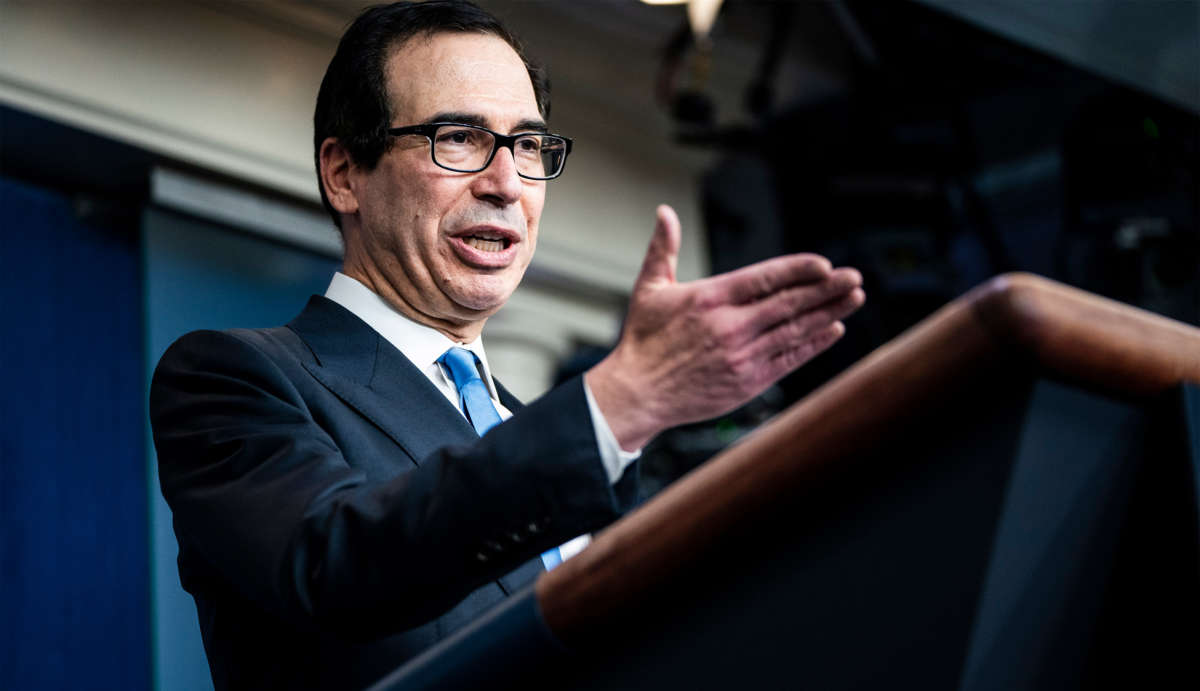Did you know that Truthout is a nonprofit and independently funded by readers like you? If you value what we do, please support our work with a donation.
United States Treasury Secretary Steve Mnuchin assured conservative lawmakers on Tuesday that unemployment benefits could not be collected by workers who refused to return to work out of fear of contracting coronavirus.
While speaking before the Senate Banking Committee, Sen. David Perdue questioned Mnuchin on whether additional aid of $600 per week in unemployment “disincentivizes” people from returning to work. It’s estimated that half the U.S. workforce could receive more income from unemployment than from their regular jobs. However, many studies in the past have also demonstrated that even generous unemployment programs don’t have much of an ill effect on keeping people from going back to their places of employment.
Nevertheless, some lawmakers remain worried that workers, fearful of contracting coronavirus, could cite those fears in order to keep collecting unemployment.
Mnuchin, who is not necessarily a friend to the working class (he was nicknamed the “Foreclosure King” during the Great Recession and benefited to the tune of millions from the Wall Street bailout of 2008), told Perdue and other members of the committee on Tuesday he was “aware of the technical problem,” but didn’t think it was something to worry over because, in his view, anyone who says they won’t return to work for those reasons would be denied unemployment insurance.
“If you offer back a worker and they don’t take that job, you will be required to notify the local unemployment insurance agency because that person will no longer be eligible for unemployment,” Mnuchin told the committee.
Such concerns by Republicans are perhaps moot points at this juncture, however, because the additional $600 per week of unemployment aid isn’t meant to last forever — per the CARES Act legislation that passed in late March, the additional funds for unemployment expire at the end of July.
There have been attempts by Democrats in the House to extend unemployment aid to workers beyond that date. But the bill passed by the House last week has little chance of getting support in the Republican-led Senate, and an even smaller possibility of being signed into law by President Donald Trump, who expressed to Republicans during a luncheon this week that he was opposed to the measure.
Americans overall are worried about returning to work amid the COVID-19 crisis. According to findings from a Washington Post/Ipsos poll published earlier this month, 58 percent of respondents said they had concerns that going to work could expose them, and in turn their loved ones at home, to the disease.
Certain individuals can continue to collect unemployment during the coronavirus pandemic, even if they are offered their jobs back. Workers with diabetes, heart disease, or immune deficiencies, fearful that going back to work will be dangerous to their health, are protected by provisions of the CARES Act. Workers who lack a way to find childcare may also be able to continue to collect unemployment.
However, a general fear of contracting the disease isn’t enough to allow workers to stay at home. Even if workers cited unsafe conditions at their places of employment, they would have to document how bad things were in order to argue that they shouldn’t have to return to work due to coronavirus concerns, a difficult and likely arduous task for an individual to go through as it involves having to make their case to the state unemployment office.
A terrifying moment. We appeal for your support.
In the last weeks, we have witnessed an authoritarian assault on communities in Minnesota and across the nation.
The need for truthful, grassroots reporting is urgent at this cataclysmic historical moment. Yet, Trump-aligned billionaires and other allies have taken over many legacy media outlets — the culmination of a decades-long campaign to place control of the narrative into the hands of the political right.
We refuse to let Trump’s blatant propaganda machine go unchecked. Untethered to corporate ownership or advertisers, Truthout remains fearless in our reporting and our determination to use journalism as a tool for justice.
But we need your help just to fund our basic expenses. Over 80 percent of Truthout’s funding comes from small individual donations from our community of readers, and over a third of our total budget is supported by recurring monthly donors.
Truthout’s fundraiser ended last night, and we fell just short of our goal. But your support still matters immensely. Whether you can make a small monthly donation or a larger one-time gift, Truthout only works with your help.
